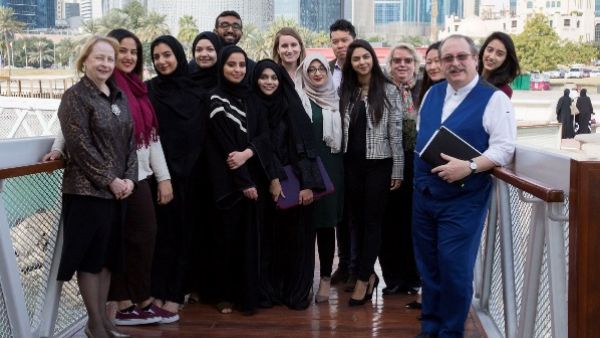QGBC experts explore significance of Qatar’s architectural heritage with NU-Q students

Qatar Green Building Council (QGBC) specialists, Dr. Alex Amato and Dr. Cynthia Skelhorn, recently organized a series of lectures for students at Northwestern University in Qatar (NU-Q), outlining the significance of Qatar’s architectural heritage. The presentations were given as part of an NU-Q course entitled ‘Advanced Online Storytelling.’
Delivered by industry experts drawn from QF Capital Projects, Qatar University, and Makower Architects, among others, the lectures provided students with an insightful and informed perspective of Doha’s recent rapid growth and its resulting architectural townscape. Valuable skills were also demonstrated, such as the use of Geographic Information Systems (GIS) in mapping Qatar’s architectural heritage.
Dr. Amato, Head of Sustainability at QGBC, said: “QGBC considers the cultural sustainability of Qatar’s built environment to be vital to the country’s long-term development. While Doha’s traditional architecture is important to this story, the city’s rapid urbanization since the onset of petrochemical wealth has resulted in the formation of many new neighborhoods that contain architecturally notable buildings that need to be acknowledged for their worth.”
Additionally, as part of the five-week course, NU-Q launched a website documenting the evolution of Qatar’s architecture and urban development. The website contributes to the further study and conservation of Doha’s unique architectural story. QGBC stressed that the students’ work was not at an end, and that it will hopefully act as a spark to generate further study.
Dr. Amato said: “We greatly appreciate the important work NU-Q’s students have carried out. It was a delight to work with them and their tutor as they immediately warmed to the project and recognized that Qatar has a rich and diverse architectural range which needs to be recorded for appreciation now and for future generations. Doha’s buildings should be acknowledged for their genuine architectural value as the city is becoming an engaging architectural hub for both experts and tourists alike.”
Dr. Amato added: “The website developed by NU-Q students is one of the best ways to extol the true significance of Qatar’s architectural heritage and to communicate this with the wider community, especially with decision-makers. We hope this is just the start, as there is still much that needs to be done, not only in terms of celebrating and recording, but also in terms of conservation, as some ‘architectural gems’ are either neglected or endangered by redevelopment.”
Dr. Cynthia Skelhorn, Research Specialist at QGBC, said: “Doha has a considerable stock of traditional architecture that needs consistent effort to preserve and retrofit. One element of preservation is to document the exact locations of architecture that are particularly iconic, noteworthy, or representative of a particular era in Qatar’s development. To this end, students were introduced to online story-maps as an effective technology for visualizing Doha’s architectural sites. We are grateful for the opportunity to begin this documentation process with such a talented group of students, and we plan to continue recording these sites following the completion of the course.”
Christina Paschyn, Assistant Professor of Journalism at NU-Q, mentored the students and oversaw the production of the website. “My students and I appreciate QGBC’s valuable contribution. We hope that through the website, local and international communities will learn more about why Doha, from its skyline to its traditional houses, looks the way it does,” she said.
QGBC, a member of Qatar Foundation for Education, Science and Community Development (QF), advocates for best-practice sustainability and green buildings in Qatar, including cultural sustainability. Additionally, the Qatar National Vision 2030 acknowledges the need to recognize and encourage Qatar’s unique heritage, extending to the country’s architecture, both traditional and more recent developments. To learn more about QGBC, visit here: http://www.qgbc.org.qa/.
The NU-Q website can be accessed at: http://sites.northwestern.edu/buildingdoha/.
Background Information
Qatar Foundation
Qatar Foundation (QF) is a non-profit organization made up of more than 50 entities working in education, research, and community development.
Our unique ecosystem—supported by partnerships with leading international institutions—is built on initiatives that address our most pressing challenges, create global opportunities, and empower people to shape our present and future.
Northwestern University in Qatar
We are educating the next generation of journalists, storytellers, and media professionals from our campus in Doha. As part of Northwestern University, one of the world’s premier research universities, we encourage the pursuit of knowledge across disciplines.






